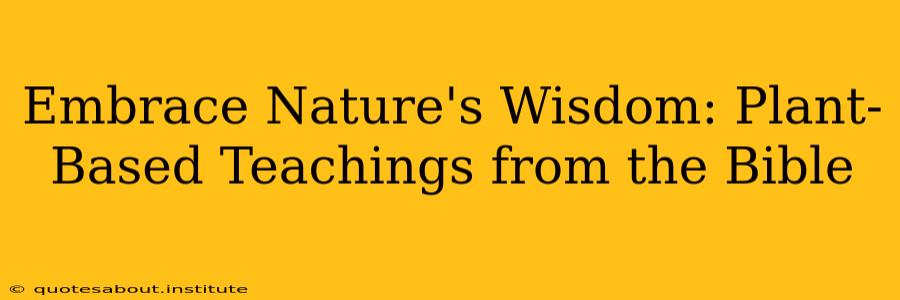The Bible, often viewed through a lens of theological debate, also offers a surprisingly rich tapestry of insights into humanity's relationship with nature, particularly concerning a plant-based diet. While not explicitly advocating veganism or vegetarianism in modern terms, numerous passages suggest a profound respect for creation and a dietary pattern that leans heavily towards plant-based sustenance. This exploration delves into the biblical narrative, revealing how a closer examination unveils a profound connection between faith, nature, and a plant-focused lifestyle.
The Garden of Eden: A Vegetarian Paradise?
Genesis 1:29 recounts God's initial provision for humanity: “Then God said, ‘I give you every seed-bearing plant on the face of the all the earth and every tree that has fruit with seed in it. They will be yours for food.’” This verse paints a picture of an Edenic paradise where humanity's sustenance comes solely from plants. The introduction of meat consumption occurs only after the fall, suggesting an original state of plant-based nourishment. This idyllic setting subtly presents a plant-based diet as the original, intended human diet.
Was the Flood a Reset?
After the great flood, God again establishes a covenant with Noah, granting permission to eat meat (Genesis 9:3). However, this permission is granted within a context of post-flood survival and shouldn't be interpreted as a wholesale endorsement of meat-eating above plant-based options. Many scholars argue the allowance was a pragmatic response to the changed circumstances, not a fundamental shift in God's ideal for humanity's relationship with the natural world.
What did God say about eating animals after the flood?
Following the flood narrative, God allows Noah and his descendants to eat meat. However, the context is significant. It's presented within the broader context of rebuilding civilization after a catastrophic event. The permission seems to be a practical measure, acknowledging the altered circumstances and the potential challenges in procuring sufficient plant-based sustenance in a post-deluge world. It is crucial to understand this permission within its narrative context, not as a definitive endorsement of meat-consumption as superior to a plant-based diet. The emphasis remains on responsible stewardship of all creation.
Daniel and the Plant-Based Diet: A Testament to Health
The Book of Daniel provides a compelling example of a plant-based diet in action. Daniel and his companions, opting for a diet of vegetables and water, exhibited superior physical and mental health compared to their meat-eating counterparts (Daniel 1:8-20). This narrative powerfully demonstrates the potential health benefits of a plant-based lifestyle, a testament to the wisdom inherent in aligning one’s diet with God's creation.
Did Daniel eat meat?
No, Daniel and his companions consciously chose a plant-based diet, rejecting the king's meat-based provisions. This decision was not merely a matter of personal preference, but a conscious choice reflecting their commitment to faith and health. Their superior physical condition after ten days on this diet served as powerful testimony to the benefits of a plant-based approach.
Jesus and the Fruits of the Earth: A Spiritual Connection
While the New Testament doesn't explicitly address dietary laws in the same detail as the Old Testament, Jesus' ministry frequently emphasizes the connection between spirituality and nature. His parables often use agricultural imagery, underlining the importance of growth, nurturing, and the bounty of the earth. This implicit connection reinforces the respect for creation, suggesting a harmonious relationship with the natural world, including the foods it produces.
What is the significance of Jesus's teachings related to food?
Jesus' teachings emphasize spiritual growth and the importance of nurturing our inner selves. His parables frequently employ agricultural metaphors, drawing parallels between spiritual growth and the cultivation of the earth's produce. These metaphorical connections highlight a deep-rooted respect for nature's gifts, subtly emphasizing the harmony between spiritual well-being and a lifestyle attuned to the natural world.
Conclusion: A Call to Stewardship
Examining the Bible's narrative reveals a profound respect for nature, with early passages suggesting an ideal plant-based diet. While the allowance of meat consumption later appears, it's crucial to view this within its historical context. The overriding theme remains one of responsible stewardship of creation, a harmony between humanity and the natural world that aligns profoundly with the health benefits and ethical considerations of plant-based living. This understanding invites a deeper reflection on our relationship with food, encouraging us to embrace a more conscious and sustainable approach to nutrition.

